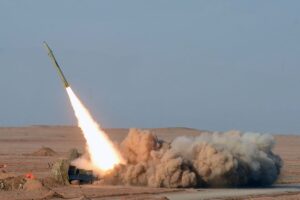
The National Interest Foundation Newsletter
Issue 221, January 26, 2024
Welcome to our NIF Newsletter. This week, we analyze how policies and viewpoints towards Israel’s ongoing War on Gaza may hold implications for the 2024 U.S. presidential election, explore the concern regarding a potential full-blown war between Israel and Lebanon amid tensions caused by cross-border attacks, and delve into the circumstances surrounding Iran’s recent missile strikes in Pakistan and the retaliatory counterstrikes that ensued thereafter.
We would also like to acknowledge the significant recent International Court of Justice (ICJ) ruling which states that Israel must prevent acts of genocide against Palestinians. The top U.N. court ordered six provisional measures to protect besieged Palestinians in Gaza. In the 29-page interim ruling, the ICJ declared that Israel needs to take actions to ensure that its soldiers and citizens adhere to the U.N. genocide convention, and must report back within a month to show how it is complying with the instructions. Although the ICJ stopped short of officially ordering a ceasefire, its ruling nevertheless amounted to an overwhelming rebuke of Israel’s wartime conduct and adds to mounting international pressure to halt the offensive that has killed more than 25,000 Palestinian civilians, decimated Gaza, and driven around 85% of citizens from their homes. The order also represented a legal setback for Israel, which had hoped to throw out the case, as the ICJ decided not to do so.
A summary of the ICJ interim ruling is below:
– ICJ finds it has jurisdiction of South Africa’s case against Israel
– Some allegations against Israel fall within the provisions of the Genocide Convention
– At least some of South Africa’s claims of violations of human rights are justified
– Court orders Israel to take all measures to prevent genocide
– Court orders Israel to prevent and punish genocide incitement
– World court orders Israel to report to the court within one month
Potential Impact of Gaza War on 2024 U.S. Presidential Election

A significant number of Americans are dissatisfied with the Biden administration’s handling of the War on Gaza. (Photo from Getty Images)
The Biden Administration’s Handling of the War on Gaza Could Potentially Impact His Re-Election Chances
In recent months since Israel’s destructive War on Gaza began, here in the United States – and in many other places around the world – the streets and social media have been taken by storm by the “Free Palestine” movement, which has seen peaceful protests and acts of solidarity in support of the Palestinian people. The youth seem to be particularly involved in this movement, evident through the participation of numerous college students in demonstrations and sit-ins on university campuses. Recent polls have suggested that nearly three-quarters of young American voters tend to be more critical of the Biden administration’s handling of and policy toward the war as compared to older voters, potentially proving to be a detriment to Biden’s 2024 re-election bid. A report from the Pew Research Center found that Gen Z and Millennials aged 18-29 favored Biden over Trump by a margin of 24% in the 2020 election. In this way, young voters make up a key demographic for the Democratic Party and the prospective votes that they may provide. If enough Democratic voters decide to not cast their vote for Biden due to his policies surrounding the War on Gaza, it could possibly spell disaster for the incumbent and give his political opponent in the U.S. presidential general election – who many political experts anticipate will likely be former President Trump – the opportunity to win crucial swing states such as Michigan, Wisconsin, Georgia, Pennsylvania, Arizona, and Nevada. Back in 2020, these states proved to be vital to Biden’s triumph in the presidential election.
Polls and projections have indicated that Biden’s electoral opponent come November will likely be Trump, who certainly faces challenges of his own for his 2024 presidential bid as a result of various legal troubles and controversies. Overall, registered voters currently prefer Trump (46%) over Biden (44%) in the forecasted upcoming general election by a margin of around 2%. With such slim margins, every vote matters and has the potential to affect the outcome of elections – particularly in the aforementioned battleground states. Testimonials from prospective voters for the 2024 general election have seen a significant amount express that they are considering not taking part at all due to President Biden’s stance on the War on Gaza, which does not align with their own pro-human rights viewpoints. These constituents would prefer that the United States under the Biden administration take a more humanitarian and diplomatic approach to the war, prioritizing the implementation of an immediate and permanent ceasefire to put an end to the killing of tens of thousands of Palestinian civilians, a disturbing number which has now exceeded 25,000. Since the Democratic Party relies on young voters as a key bloc in its coalition, the generational divide over the War on Gaza could be an influential component in the 2024 presidential election.
The potential relevance of Gaza War policies on Democratic voter sentiments has been outlined in the various findings of surveys conducted on the issue. A recent one conducted back in December highlighted that 65% of Democrats believe it is extremely or very important for the United States to provide humanitarian relief to Palestinians in Gaza, compared to a much smaller only 28% of Republicans. A similar percentage (64%) of Democrats expressed that it is very important for the United States to negotiate a permanent ceasefire in Gaza, while 35% of Republicans did the same. This signifies how much more of a factor the subject of the War on Gaza could potentially play among the Democratic base and expected Biden supporters in the 2024 presidential general election. The issue surrounding the U.S. providing aid to Israel’s military received lower ratings among Democrats as well. Additionally, Democrats were less enthusiastic about President Biden’s handling of the War on Gaza than they were regarding his overall job performance.
There is a belief that voters on both sides of the aisle, but especially Democrats, may start gravitating toward a third-party or independent candidate such as Jill Stein or Robert Kennedy Jr., or could even end up simply abstaining from voting in the upcoming presidential general election at all. While this loss of votes in either fashion might not seem significant enough on the surface, it could actually very well determine the final outcome of the election. In the 2020 U.S. presidential general election between President Biden and former President Trump, Biden won six swing states by narrow margins, three of which were won by less than 21,000 votes. Thus, if a sizable number of voters jump ship due to Biden’s policy towards the War on Gaza, he may very well lose tight states that were critical to his eventual Electoral College victory in 2020. At the same time, for other voters, Biden’s stance on the Gaza War might not hold enough sway to influence their decision to cast their ballot for him. Domestic policies tend to hold more issue salience for American voters than foreign policy considerations. According to a poll conducted by the Pew Research Center, the economy, health care, and Supreme Court appointments were the top three issues of importance to voters, while foreign policy ranked sixth. Some may begrudgingly decide to vote for Biden if only to avoid a return of Trump to the White House, or vice versa, and others might abstain from voting entirely or vote for a third-party candidate. Given the array of prevalent recent global occurrences though, foreign policy issues will certainly be weighing on some voters’ minds when Election Day arrives in November, and it will likely come down to whether or not the voter drop-off is significant enough to outweigh those who will still cast their votes for one of the two main party candidates regardless.
Concern Regarding Israel-Lebanon Tensions

Preventing the situation from deteriorating is particularly important in the midst of other existing regional tensions. (Photo
from AFP)
Tensions on the Israel-Lebanon Border Threaten a Full-Blown Conflict
As Israel’s War on Gaza presses on, other conflicts in the region are on the verge of escalating. Tensions are especially evident on the Israel-Lebanon border, where Hezbollah and Israel have been exchanging cross-border attacks since the onset of the Gaza War. The situation emerged in response to Israel’s bombardment of Gaza, which has resulted in the killing of more than 25,000 Palestinian civilians. Hezbollah has expressed that the goal of its actions is to divert Israeli military resources away from Gaza. As such, several commentators pointed out that Hezbollah targets had initially been limited to military ones located along the border zone. Back in early January, Israel carried out an assassination with a drone strike conducted in a populated neighborhood in the capital city of Beirut. This escalated Israel-Lebanon border tensions and led to retaliatory attacks from Hezbollah, who have since attacked Israeli military posts.
A recent Washington Post article unveiled that United States officials have privately warned Israeli Prime Minister Benjamin Netanyahu against opening a second front in Lebanon, with a secret assessment from the Defense Intelligence Agency (DIA) in Washington D.C. stating that Israeli forces would find it “difficult to succeed” in a multi-front conflict in both Gaza and Lebanon. Officials fear that a full-scale conflict between Israel and Lebanon would exceed the bloodshed and damage from the 2006 Israel-Lebanon War due to Hezbollah’s substantially larger arsenal of long-range and precision weaponry. Since then, Hezbollah is believed to have bolstered its arsenal to be well over 100,000 missiles, with many of these having precision capabilities. There is also concern that any further escalations could draw in other regional actors and proxy forces as well. Thus, it is in no entity’s interest to get dragged into a full-scale war in which heavy losses would be incurred. U.S. and European diplomats have made trips to Lebanon and Israel to try to avoid escalation of the tensions, which could possibly lead to a larger regional conflict. The U.S. has a vested interest in achieving a peaceful resolution and putting an end to a situation that, according to Secretary of State Antony Blinken, could easily “metastasize” and lead to a large-scale conflict in which both sides would become deeply entrenched.
Thus far, attempts at achieving a peaceful solution have been unsuccessful with neither side able to find a compromise on the issue. Israeli Prime Minister Netanyahu is supposedly looking to achieve a border deal, however Hezbollah appears focused on achieving a lasting ceasefire in Gaza. Hezbollah leaders have expressed that a ceasefire would be required before any diplomatic talks would be considered between the two countries, yet again highlighting the importance of a cessation of Israeli hostilities in Gaza.
Achieving a peaceful resolution to the situation has become an increasingly troublesome and difficult task. Benny Gantz, a senior Israeli minister and current member of Israel’s emergency war cabinet, made comments that signified the possibility of military escalation with Hezbollah and stated that the chances of a diplomatic solution are dwindling. Gantz is just one of many Israeli officials who have made inflammatory remarks that stray from a diplomatic and peaceful solution. Other hawkish comments came from Yaakov Amidror, Israel’s former National Security Advisor, who reported that soldiers will be sent to the northern border to prepare for a full-scale war, and from Israel’s Foreign Minister Eli Cohen, who stated that Israel may target Hezbollah official Hassan Nasrallah and that all options are on the table. Despite Israel’s counterproductive statements, the U.S. and its European allies have continued to make attempts at finding a diplomatic solution. The departure of the USS Gerald R. Ford from the Mediterranean Sea after an eight-month deployment signaled to Lebanon that the U.S. was serious about de-escalating the situation in the region and underscored the importance of a diplomatic approach. With tensions high, the parties involved must pursue a solution in which an all-out war is evaded, and peace is prioritized.
Circumstances Surrounding Iran-Pakistan Tit-For-Tat Strikes

Iran and Pakistan have agreed to de-escalate tensions after a recent exchange of airstrikes heightened uneasiness over possible regional escalations. (Photo from AFP)
Initial Fears of Further Regional Escalations Resulting from Iran-Pakistan Tit-for-Tat Strikes are Quelled Following the Agreement to Resume Full Diplomatic Ties
Earlier this week, Iran and Pakistan announced that they will resume diplomatic relations following a period of heightened tensions in which the two countries exchanged tit-for-tat missile strikes. The de-escalation efforts come nearly a week after Iran struck alleged terror targets inside Pakistan, and the latter responded with counterstrikes against purported terror hideouts in Iranian territory. This led to a sharp deterioration in diplomatic relations, with ambassadors being withdrawn and a spike in inflammatory rhetoric. The attacks had therefore understandably drawn alarm regarding the prospect of further regional escalations and wider-scale conflict, especially in the midst of already-existing tensions across the Middle East in Gaza, the Red Sea, Lebanon, and elsewhere. Thus, the mitigation of hostilities was welcomed by peace activists as a positive development.
The recent attacks between Iran and Pakistan were the first direct ones on each other’s territory since the late 1980s. Iran launched a missile strike on a town in the Balochistan province of Pakistan, targeting alleged sites of Jaish al-Adl – a militant Baluchi separatist organization accused of carrying out attacks on Iranian security forces in Iran’s Sistan and Baluchestan province. This prompted Pakistan to retaliate, striking supposed hideouts of Pakistani separatist groups such as the Baloch Liberation Front and the Baloch Liberation Army. Analysts have expressed that Iran’s initial airstrikes were likely driven by domestic anxieties in the wake of the deadly ISIS regional affiliate bombing which killed more than 100 people and wounded many others at a memorial in Kerman for deceased general Qassem Soleimani. The missile strikes on Pakistan come amid other Iranian strikes in Iraq and Syria, all appearing to be part of a series of retaliations against perceived adversaries following the Kerman bombing. Back in December, Jaish al-Adl took credit for an attack on a police station in the Sistan and Baluchestan province, and Iran’s interior minister criticized Pakistan’s border security efforts as the reason why the incident was allowed to happen. Along the same line, Pakistan has its own issues with Baloch separatist groups and often accuses Iran of providing a safe haven for them. Issue experts have outlined that rather than placing blame and carrying out missile strikes on each other’s sovereign territory, Iran and Pakistan would benefit more from collaborative intelligence sharing and initiatives aimed at addressing the root causes of the Baloch separatist movements.
Various analysts have pointed out that one of the reasons for the tit-for-tat attacks has been domestic political considerations and the desire to appear strong, a trend exhibited throughout other conflicts in the region. According to AP, the image of a strong military plays a key component in Pakistan’s upcoming general election and was allegedly one of the justifying reasons for the counterstrike. When dealing with the fragility of foreign affairs, leaders would be wise to pursue a policy of restraint instead of pandering to their domestic voter base, which could ultimately lead them down a dangerous path to war. What worried observers in the immediate aftermath of the tit-for-tat strikes is the fact that the situation materialized at a time when the wider region is already embroiled in tension on multiple fronts due to Israel’s ongoing hostilities in Gaza. Commentators have stressed how the outrage over actions there is a definite cause of much of the turmoil that has manifested including the Red Sea crisis and the circumstances along the Israel-Lebanon border. Therefore, the spike in Iran-Pakistan tensions merely added to existing fears of further regional aggravations. Following Iran and Pakistan’s initial move to withdraw ambassadors from each other’s respective capital cities, the two countries later agreed to de-escalate by returning the aforementioned diplomats to their posts and planning for an upcoming visit between foreign ministers. Those talks are slated to take place in Islamabad next week, and will focus on how to best handle the threat posed by insurgent groups and mutual border security.
The move to alleviate tensions in the aftermath of the Iran-Pakistan strikes were a welcomed development in the aim of preventing further regional escalations. International spectators such as the U.S., China, and the United Nations had played a role in advocating for the de-escalation between the two countries, with U.N. Secretary-General Antonio Guterres advising that the two operate with restraint. This successful de-escalation may indicate that there is hope for more diplomatic solutions in the region as well. For this reason, influential global actors such as the United States should prioritize pursuing diplomatic approaches to tensions in the Middle East and refrain from using any potential heavy-handed tactics in the region.
